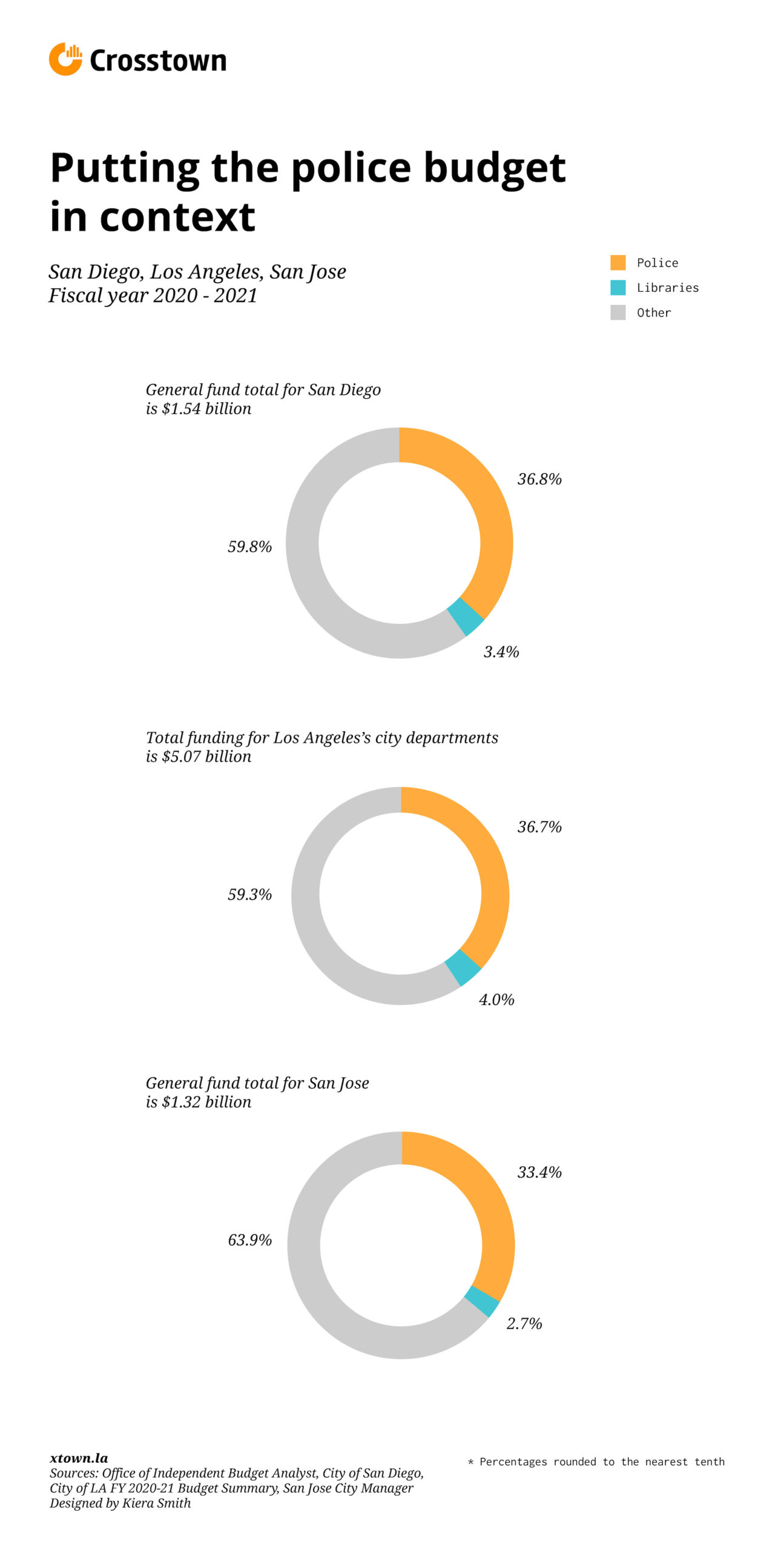Chipping away at LA’s police budget

The past few days have been filled with images of Los Angeles Police Department officers clad in ballistic helmets, tactical vests and face shields at protests of the murder of George Floyd. Contrast that with the images of nurses at Good Samaritan Hospital protesting over the lack of personal protective equipment for frontline health care workers treating COVID-19 patients.
That mismatch has sparked a debate about whether the city should reconsider how much it budgets for the LAPD. On Wednesday, City Council President Nury Martinez introduced a motion to redirect up to $150 million of police funding toward disadvantaged communities.
“Ultimately we cannot talk about change,” Martinez tweeted Wednesday afternoon. “We have to be about change.”
Mayor Eric Garcetti had initially proposed a roughly $130 million increase to the police budget. But on Wednesday, he reversed himself. In addition to endorsing cuts of up to $150 million from the proposed LAPD budget, he pledged to reallocate additional money, for a total of $250 million, from other city expenses to be reinvested in disadvantaged communities.
LAPD’s slice of the budget pie
Traditionally, the police budget in Los Angeles has been politically untouchable, even during decades that saw consecutive internal scandals, conflicts with African Americans and other communities of color and episodes of excessive use of force. Mayor Antonio Villaraigosa, Garcetti’s predecessor, declared growing the LAPD to over 10,000 officers as one of his major policy goals. (It did not happen till after he left office.)
The proposed budget for 2020-21 called for a 7% increase in police funding, to $1.86 billion, by far the largest single expense in the City of Los Angeles. Advocates for slashing spending on police say this figure is equal to 54% of “unrestricted” general fund revenue, money that the city has discretion to spend as it likes because it has not been earmarked for specific purposes. This $1.86 billion only deals with salaries, expenses and equipment costs; another $1.29 billion, which is not a part of the departmental costs, is devoted to pensions for retired officers, building upkeep and human resources.
The mayor’s budget frames the $1.86 billion for the police as 18% of the city’s entire general fund of $10.53 billion, which includes an array of additional expenses, from pensions to financing costs. However, when compared against the $5.07 billion the city spends to fund all of its departments, from sanitation to the zoo, the LAPD receives 37%.
From LA to San Diego, San Jose
Against that backdrop, Los Angeles is in line with San Diego, California’s second-largest city, which spends about 37% of its general fund on police. San Jose spends about 33%. Cities use different systems for their budgeting, making exact comparisons difficult.
The vast majority of the money spent on each city’s police department goes to salaries. In the 2018 fiscal year, the most recent period for which data is available, the average salary for a police officer of rank I, II and III in Los Angeles was $113,649 a year.
The People’s Budget LA, a coalition brought together by Black Lives Matter Los Angeles, said they want to see more money invested in public transportation, mental health services, public schools and services for people experiencing homelessness, according to their website.

After protests at the mayor’s residence and outrage at a LAPD Commissioner meeting on Tuesday, the City Council and Mayor Garcetti put forth their proposals to reduce spending on police.
But the Los Angeles Police Protective League, the main police union, pushed back. It accused Martinez, the city council president, of failing a leadership test because she chose to tweet instead of calling them directly.
“We have that same phone number that Ms. Martinez has called in the past when she has had a law enforcement question or concern,” said the LAPPL in a statement. They added Martinez was using them for political cover and “creating a deeper division between our police officers and the community.”
Political pushback
Revising budget numbers, particularly for the police department, is politically stressful. The police union is a powerful force, and support for public safety spending in many –– but not all –– parts of the city is generally strong, even though Angelenos disagree on where exactly the funding should go.
However, that does not mean reform is impossible. Raphael Sonenshein, executive director of the Pat Brown Institute for Public Affairs at California State University, Los Angeles, said that in the wake of the 1992 uprising after the beating of Rodney King, the department reoriented its approach toward more community-based policing, though many problems persisted.
“I could not have imagined it was going to be possible even then,” Sonenshein said. “I would say that from what I’ve seen over the last few days, there are more things being proposed drawing a wider range of support than occurred after ’92.”
The budget, which usually gets little public attention, has suddenly become a topic of conversation for many Angelenos, especially during the economic crisis resulting from COVID-19.
North Hollywood resident Laurel Vail does not think a $150 million cut for LAPD is enough, calling the amount a “drop in the bucket” on Twitter in response to the news, adding that Angelenos should see more money going to the community instead.
“More resources for homelessness for starters,” Vail responded when asked about the changes she’d like to see. “I’m no expert on policy, but this city should be more proactive in dealing with the housing crisis before militarizing our police force. Many unhoused people work full-time and still can’t afford to live in this city.”
The People’s Budget LA, along with residents like Vail, are beginning to look at how little money is available for public resources, such as libraries. The proposed 2020-21 budget for the City of Los Angeles allocates 4% for libraries.
How we did it: We examined budget data for the cities of Los Angeles, San Diego, and San Jose.
Interested in our data or have additional questions? Email us at askus@xtown.la.






